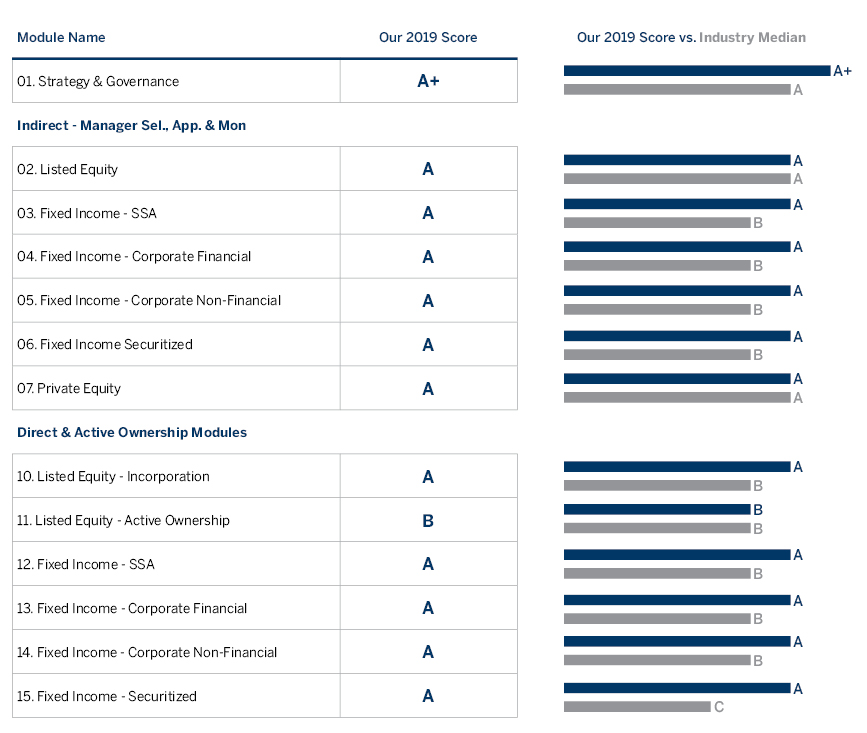Brown Advisory has been a signatory to the PRI (Principles for Responsible Investment) since 2014, and each year, we complete a rigorous disclosure of our sustainable investing practices as part of our obligation as a signatory. PRI is the nexus for a massive, global network of asset owners and investment managers—its 2,350+ signatories as of June 30, 2019 represent more than $86 trillion of invested assets. While the PRI is not a ratings agency, PRI disclosures and the organization’s assessment of those disclosures are widely followed by investment decision-makers around the world.
We are pleased to share the PRI’s 2019 assessment of Brown Advisory’s sustainable investing practices; our scorecard is provided below. Across multiple asset classes, and with regard to our direct management of securities portfolios as well as our selection and monitoring of third-party managers, we received “A” scores in nearly every category. We are especially gratified by the A+ score (the highest attainable) we received in the Strategy and Governance category; we see this as a strong external validation of our firm’s and our senior leadership’s commitment to sustainable investing.
The PRI disclosure process was designed purposefully to encourage progress by revealing best practices to signatories; the process provides invaluable guidance to us every year on additional steps we can take as a firm. We look forward to follow-up consultation with PRI staff in the coming months, to identify opportunities to further enhance our solutions for clients.
Please feel free to get in touch with us with any questions about the PRI disclosure process or about our 2019 assessment. 
2019 PRI Assessment Report for Brown Advisory: Summary Scorecard
Source: UNPRI.
The views expressed are those of Brown Advisory as of the date referenced and are subject to change at any time based on market or other conditions. These views are not intended to be and should not be relied upon as investment advice and are not intended to be a forecast of future events or a guarantee of future results. Past performance is not a guarantee of future performance and you may not get back the amount invested.
The information provided in this material is not intended to be and should not be considered to be a recommendation or suggestion to engage in or refrain from a particular course of action or to make or hold a particular investment or pursue a particular investment strategy, including whether or not to buy, sell, or hold any of the securities mentioned. It should not be assumed that investments in such securities have been or will be profitable. To the extent specific securities are mentioned, they have been selected by the author on an objective basis to illustrate views expressed in the commentary and do not represent all of the securities purchased, sold or recommended for advisory clients. The information contained herein has been prepared from sources believed reliable but is not guaranteed by us as to its timeliness or accuracy, and is not a complete summary or statement of all available data. This piece is intended solely for our clients and prospective clients, is for informational purposes only, and is not individually tailored for or directed to any particular client or prospective client.
UNPRI is an independent organization that oversees a global disclosure process for its more than 2350 member organizations (primarily investment firms and asset owners that are referred to as PRI “signatories”). Every year, signatories complete a detailed questionnaire with information about their sustainable investment practices in manager selection, securities research, engagement with shareholders, proxy voting and other areas. Each answer is awarded 0,1,2 or 3 points by PRI’s assessment team based on key activities or practices that PRI deems favorable, and the sum total of points awarded within each section of the report determines the recipient’s letter grade (from A+ on the high end to E on the low end) for that section. Letter grades are based on absolute point totals, and are not based on a distribution curve.

